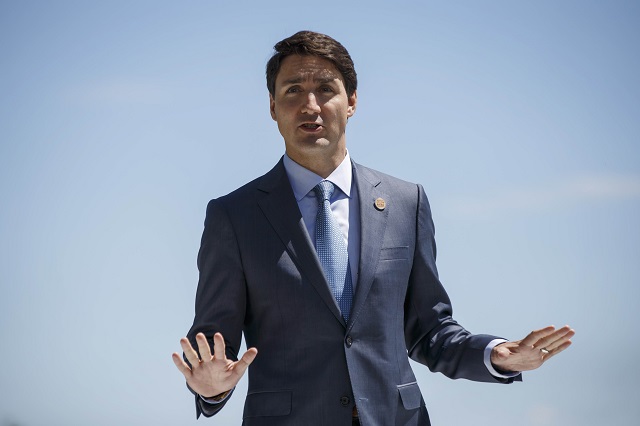Opinion
Trudeau’s home heating oil exemption shows politics trumps real affordability

From the Canadian Taxpayers Federation
Author: Jay Goldberg
It turns out desperate pigs really do fly.
In a colossal policy reversal, Prime Minister Justin Trudeau announced a suspension of the carbon tax on home heating oil for the next three years. But that one concession favours one region over others and is far from enough to protect Canadians from the brutal realities of the carbon tax’s impact on family budgets.
Trudeau’s carbon tax concession was specifically targeted at Atlantic Canada because it deals with home heating oil. Forty per cent of Atlantic Canadian households use heating oil to heat their homes. Compare that to just two per cent of Ontario households.
Atlantic Canada had a special deal with Trudeau until this summer. The federal government gave Atlantic provinces permission to exempt home heating oil from their carbon taxes.
But the region’s special deal ran out in July, with full federal carbon tax pricing kicking in on Canada Day, including on heating oil.
With winter fast approaching, taxpayers in Atlantic Canada recognized the massive tax hike they were about to face just to stay warm.
Last winter, Atlantic Canadian households paid no carbon tax on their home heating oil bill. This winter, the average household was poised to spend $272.
Public opinion polls of late show Atlantic Canadians are preparing to vote with their chequebooks. The anti-carbon tax Conservatives are gaining steam.
The Conservatives forced a vote in the House of Commons on repealing the carbon tax earlier this month. One Liberal MP from Newfoundland and Labrador had the courage to stand up for his constituents and vote to repeal the tax.
Avalon MP Ken McDonald was crystal clear in articulating why he voted the way he did.
“I’ve had people tell me they can’t afford groceries,” McDonald said. “They can’t afford to heat their homes. You can’t make it more expensive on people than what they can handle. And that’s exactly what’s happening right now.”
McDonald spoke a truth Trudeau has consistently refused to hear, or at least acknowledge. The federal carbon tax is making life less affordable for Canadians.
A report from the non-partisan Parliamentary Budget Officer shows this plain as day. This year, the average Canadian family will lose between $347 and $710 due to the carbon tax, even after the rebates.
After McDonald voted to repeal the carbon tax, other Liberal MPs from Atlantic Canada voiced their concerns in public.
In the wake of all of this, Trudeau caved. He announced a three year suspension of the carbon tax on home heating oil. Conveniently, that suspension ends just after the next federal election.
Most Ontario households use natural gas to heat their homes. It’s cleaner than home heating oil, but Trudeau is keeping the carbon tax on natural gas in place.
That’s proof that this is all about politics.
The average Ontario household using natural gas will be paying a $326 carbon tax bill this winter. Those folks won’t get an exemption under Trudeau’s new plan.
If Liberal MPs in Ontario take a courageous stand like McDonald did in Newfoundland, families here wouldn’t get punished with a carbon tax for heating their homes.
What shouldn’t be lost in any of this is that carbon tax misery will still be felt coast to coast, even though many in Atlantic Canada are getting special treatment.
Families in every province will still pay carbon taxes at the pumps when filling up to drive the kids to school. And food will still be more expensive because truckers who ship the food and farmers who produce the food will still be paying carbon taxes on fuel.
It’s time for Trudeau to stop driving up the cost of living and dividing Canadians based on political calculations. The feds need to axe the carbon tax on everything everywhere, no matter the postal code.
Censorship Industrial Complex
US Under Secretary of State Slams UK and EU Over Online Speech Regulation, Announces Release of Files on Past Censorship Efforts

Sarah Rogers’ comments draw a new line in the sand between America’s First Amendment and Europe’s tightening grip on online speech.
|
|
Business
“Magnitude cannot be overstated”: Minnesota aid scam may reach $9 billion

Federal prosecutors say Minnesota’s exploding social-services fraud scandal may now rival nearly the entire economy of Somalia, with as much as $9 billion allegedly stolen from taxpayer-funded programs in what authorities describe as industrial-scale abuse that unfolded largely under the watch of Democrat Gov. Tim Walz. The staggering new estimate is almost nine times higher than the roughly $1 billion figure previously suspected and amounts to about half of the $18 billion in federal funds routed through Minnesota-run social-services programs since 2018, according to prosecutors. “The magnitude cannot be overstated,” First Assistant U.S. Attorney Joe Thompson said Thursday, stressing that investigators are still uncovering massive schemes. “This is not a handful of bad actors. It’s staggering, industrial-scale fraud. Every day we look under a rock and find another $50 million fraud operation.”
Authorities say the alleged theft went far beyond routine overbilling. Dozens of defendants — the vast majority tied to Minnesota’s Somali community — are accused of creating sham businesses and nonprofits that claimed to provide housing assistance, food aid, or health-care services that never existed, then billing state programs backed by federal dollars. Thompson said the opportunity became so lucrative it attracted what he called “fraud tourism,” with out-of-state operators traveling to Minnesota to cash in. Charges announced Thursday against six more people bring the total number of defendants to 92.
BREAKING: First Assistant U.S. Attorney Joe Thompson revealed that 14 state Medicaid programs have cost Minnesota $18 billion since 2018, including more than $3.5 billion in 2024 alone.
Thompson stated, "Now, I'm sure everyone is wondering how much of this $18 billion was… pic.twitter.com/hCNDBuCTYH
— FOX 9 (@FOX9) December 18, 2025
Among the newly charged are Anthony Waddell Jefferson, 37, and Lester Brown, 53, who prosecutors say traveled from Philadelphia to Minnesota after spotting what they believed was easy money in the state’s housing assistance system. The pair allegedly embedded themselves in shelters and affordable-housing networks to pose as legitimate providers, then recruited relatives and associates to fabricate client notes. Prosecutors say they submitted about $3.5 million in false claims to the state’s Housing Stability Services Program for roughly 230 supposed clients.
Other cases show how deeply the alleged fraud penetrated Minnesota’s health-care programs. Abdinajib Hassan Yussuf, 27, is accused of setting up a bogus autism therapy nonprofit that paid parents to enroll children regardless of diagnosis, then billed the state for services never delivered, netting roughly $6 million. Another defendant, Asha Farhan Hassan, 28, allegedly participated in a separate autism scheme that generated $14 million in fraudulent reimbursements, while also pocketing nearly $500,000 through the notorious Feeding Our Future food-aid scandal. “Roughly two dozen Feeding Our Future defendants were getting money from autism clinics,” Thompson said. “That’s how we learned about the autism fraud.”
The broader scandal began to unravel in 2022 when Feeding Our Future collapsed under federal investigation, but prosecutors say only in recent months has the true scope of the alleged theft come into focus. Investigators allege large sums were wired overseas or spent on luxury vehicles and other high-end purchases. The revelations have fueled political fallout in Minnesota and prompted renewed federal scrutiny of immigration-linked fraud as well as criticism of state oversight failures. Walz, who is seeking re-election in 2026 after serving as Kamala Harris’ running mate in 2024, defended his administration Thursday, saying, “We will not tolerate fraud, and we will continue to work with federal partners to ensure fraud is stopped and fraudsters are caught.” Prosecutors, however, made clear the investigation is far from finished — and warned the final tally could climb even higher.
-

 Alberta1 day ago
Alberta1 day agoAlberta project would be “the biggest carbon capture and storage project in the world”
-

 Energy1 day ago
Energy1 day agoNew Poll Shows Ontarians See Oil & Gas as Key to Jobs, Economy, and Trade
-

 Business24 hours ago
Business24 hours agoSocialism vs. Capitalism
-

 Energy22 hours ago
Energy22 hours agoCanada’s debate on energy levelled up in 2025
-

 Daily Caller18 hours ago
Daily Caller18 hours agoIs Ukraine Peace Deal Doomed Before Zelenskyy And Trump Even Meet At Mar-A-Lago?
-

 Business4 hours ago
Business4 hours ago“Magnitude cannot be overstated”: Minnesota aid scam may reach $9 billion
-

 Energy2 days ago
Energy2 days agoWhile Western Nations Cling to Energy Transition, Pragmatic Nations Produce Energy and Wealth
-

 International2 days ago
International2 days agoNo peace on earth for ISIS: Trump orders Christmas strikes after Christian massacres










